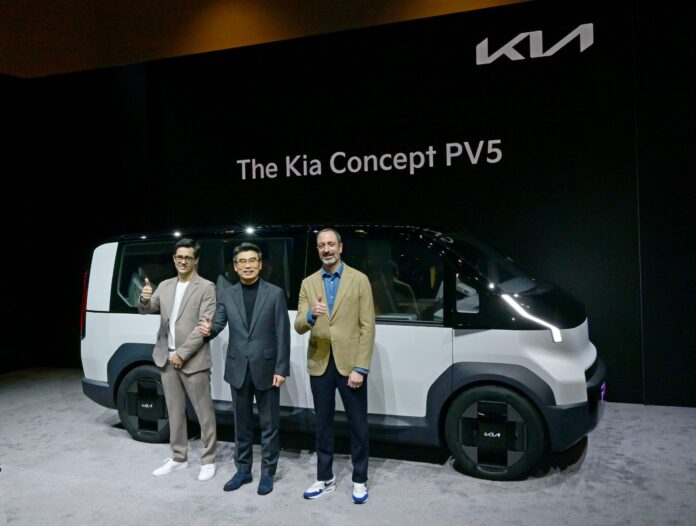Kia has revealed its Platform Beyond Vehicle (PBV) future strategy at the 2024 Consumer Electronics Show (CES) in Las Vegas. Kia’s PBV business will initially be based around the introduction of an all-new, modular vehicle, previewed by the Kia Concept PV5.
This future vision was presented alongside a multi-phase plan with the goal of PBVs revolutionizing the mobility industry while helping to advance Hyundai Motor Group’s ambitions in robotics, Advanced Air Mobility (AAM), and autonomous driving.
Kia PBVs are intended to be a total mobility solution that combines fit-for-purpose EVs with advanced software solutions based on the Hyundai Motor Group’s software-to-everything, or SDx, strategy. As a Platform Beyond Vehicle, Kia PBVs are designed to open the door to new businesses and lifestyles by redefining the concept of space thanks to advanced, tailored interiors that provide freedom and flexibility.
“Kia’s PBV business represents our vision of going beyond the traditional concept of automobiles by fulfilling the unmet needs of diverse customers and communities through optimized vehicles and services catering to specific market and business circumstances,” said Ho Sung Song, Kia Corporation President and CEO.
The launch of Kia’s PBV business will see the brand commit to providing a varied range of customized vehicle types to meet customers’ individual requirements. Determined to overcome existing restrictive and one-dimensional industry product line-up offerings, Kia believes its new approach to PBVs can help solve various mobility challenges encountered by individuals and organizations with limited transportation options.
Kia’s PBV offering will be built around a dedicated business system, integrating vehicles, software, and future technologies to deliver added value.
The brand’s PBV roadmap, divided into three distinct phases, illustrates how Kia PBVs will be pivotal in realizing the Group’s SDx vision as devices that offer tailored solutions according to customer usage patterns.
In phase one, Kia plans to introduce the Kia PV5, a versatile EV optimized for major domains such as hailing, delivery and utilities that features conversion capability for diverse customer needs. Enhanced data connectivity between vehicles and external data such as route or delivery information is intended to enable convenient operation of multiple vehicles as a software-defined fleet.
The plan for phase two is to see the completion of the dedicated PBV model line-up, with PBVs evolving into AI-based mobility platforms that use data to interact with users and help keep vehicles updated. An integrated PBV solution can help provide a customized, seamless experience across devices and software.
In phase three, Kia PBVs are expected to evolve into highly customizable, bespoke mobility solutions by integrating with the future mobility ecosystem.




